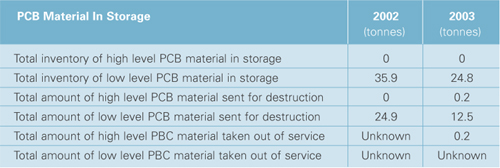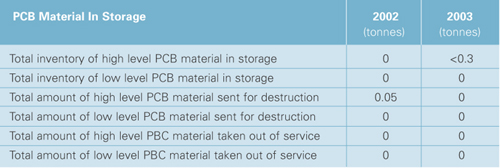|
The majority of waste produced at our operating facilities is disposed of through government approved
waste management systems, and do not require special handling and disposal. Below is information on
special waste handling and recycling activities.
The Hydro Group operates two approved PCB waste storage facilities located in Bishop's Falls and
Churchill Falls.
BISHOP'S FALLS
In 2003, 1.4 tonnes of low level PCB material was placed in storage at the Bishop's Falls facility. This
brought the total quantity of low level PCB material at this facility to 37.3 tonnes. Approximately 12.5
tonnes was removed from storage during 2003 and destroyed. Therefore, the total quantity of low level PCB
material in storage as of December 31, 2003 was 24.8 tonnes. As of December 31, 2003, there was no high
level PCB material in storage (Table 1), however, approximately 0.2 tonnes was sent for destruction
in 2003.


It is recognized that some older equipment such as capacitors and fluorescent light ballasts, which may
contain high levels of PCB, remains in service. It is estimated that there is less than one tonne of such
PCB material remaining in service.
It is known that a portion of the older distribution transformers in service throughout the system contain
oil which is contaminated with PCB to a level greater than 50 ppm. Hydro has initiated a multi-year
program to reduce PCB contaminated equipment in service. This program involves the identification, testing,
and removal from service or refurbishment of all electrical equipment with a PCB level greater
than 50 ppm.
CHURCHILL FALLS (CF(L)Co)
Table 2 provides an inventory of PCB material in storage and in service as of December 31, 2003, in
Churchill Falls. At present, the total amount of low level and high level PCB material in storage is
less than 0.3 tonnes. There was no PCB material sent for destruction in 2003. PCB material known to be in
service are ballasts and capacitors, however, there is no inventory completed of this electrical equipment
to date. Once draft new PCB regulations are finalized, CF(L)Co will compile the inventory of PCB material
equipment as required.


INSULATING OIL
The quantities of electrical insulating oil reused and recycled by Hydro and CF(L)Co. in 2003 was
approximately 282,000 litres.
In 2003, approximately 128,400 litres of insulating oil, which did not meet the specification for reuse,
was supplied to a third party for energy recovery.
LUBRICATING OIL
Waste lubricating oil from throughout Hydro's operating systems is captured and supplied under contracts
to government certified waste oil handlers for recycling or energy recovery. The volumes of lubricating
oil provided to these parties in 2003 totaled approximately 107,600 litres.
SCRAP METAL
CF(L)Co., again in 2003, completed a successful year in its scrap metal recycling program. Approximately
81 tonnes of overhead ground wire from the 735 KV line and 91 tonnes of miscellaneous scrap metal from
outlying properties was recycled.
Hydro's Generation Division put a large focus on scrap metal recovery in 2003. Approximately eight tonnes
of condemned road culverts, structural steel, components of generating units and electrical panels that
had been accumulating for years was collected and sent for recycling. This compares to approximately 0.7
tonne recycled in 2002.
Our Transmission and Rural Operations Division, through auctions, sent approximately 54 tonnes of scrap
transformers and conductor to metal recyclers in 2003.
TREATED WOOD
Treated wood is essential for the reliability of wood pole transmission and distribution line systems
since treated wood has a longer service life than untreated wood. We recognize that treated wood must be
used and managed in a responsible manner. Whenever Hydro uses treated wood, specific guidelines are
followed to minimize the potential impact of preservatives on the surrounding environment. The potential
for wood preservative contamination during installation, maintenance and disposal are always
considered.
In 2003, Hydro implemented a new record keeping system in the Central Region to accurately track wood
poles. The system will be implemented in the other two regions in 2004. Approximately 80 percent of all
material removed from service is given to individuals or groups outside of Hydro for reuse, 15 percent
was taken from work sites before it could be transported to a storage area, and the remaining five percent
was held in storage for testing and recycling. Approximately 90 percent of this material was treated with
pentachlorophenol (Penta), eight percent was treated with copper chromated arsenate (CCA) and the remaining
two percent was treated with creosote. Disposal of treated wood at landfill sites is only considered if the
material is deemed unsalvageable. In 2003, approximately two tonnes of Penta treated wood was taken to
landfills for disposal.
Despite all reasonable efforts, Hydro continues to experience problems with the loss of salvageable
treated wood from work sites before it is moved to secured marshalling yards and/or depots. It is
speculated that this material is being taken by individuals who are taking advantage of the opportunity
to obtain building material that they believe is destined to be discarded as waste. Hydro will be
implementing measures to make the public aware that the use of this material for unauthorized purposes
can be hazardous.
In 2003, Hydro purchased 30 CCA, 15 Penta, and two untreated transmission poles, and 938 CCA, 64 Penta,
and 32 untreated distribution poles.
BOILER ASH
Boiler ash is produced at the Holyrood Thermal Generating Station as a result of the combustion
process. During 2003, approximately 600 tonnes of fuel ash was produced and disposed of at an on-site,
controlled solid waste landfill.
|
